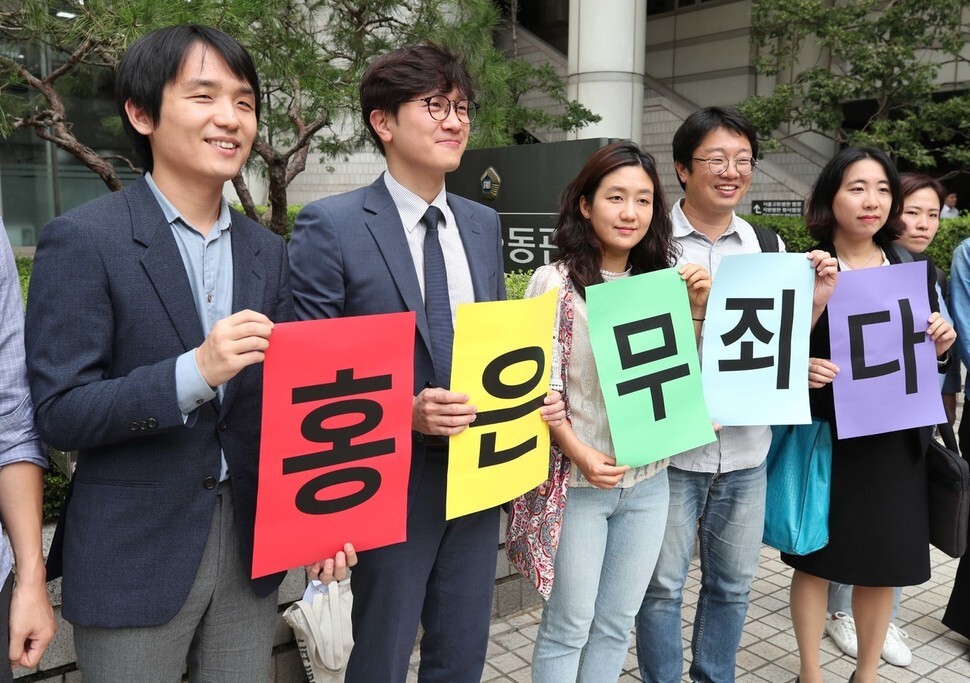hankyoreh
Links to other country sites 다른 나라 사이트 링크
Seoul court convicts non-religious conscientious objector in appeals trial

A Korean who refuses to perform his mandatory military service based on pacifism, rather than religion, has been found guilty on appeal. At the same time, the court said there was no reason to differentiate between religious and non-religious convictions when assessing conscientious objection.
On Sept. 26, Hon. Hong Jin-pyo, a judge with Criminal Division 4-2 at the Seoul Central District Court, rejected an appeal by Hong Jeong-hun, 29. Hong, who cited his pacifism when refusing to report for duty, was convicted by a district court of violating the Military Service Act and given a prison sentence of one year and six months. However, Hong was not taken into custody.
“If an individual cannot perform their military service without violating their conscience and feels that their personal values and sense of meaning would be destroyed by performing their military service, that counts as a legitimate form of conscientious objection,” the court said, arguing that conscientious objection should be reviewed without distinguishing between religious and non-religious grounds.
But the court also said that “convictions that are altered strategically, or compromised according to circumstances, cannot be regarded as true,” finding that Hong fell into that category. Noting that Hong had thought about doing industrial service, a type of reserve military service, before deciding on conscientious objection, the court concluded that “for a conscientious objector to countenance the idea of doing industrial service, which still requires four weeks of basic training, would be a betrayal of his own convictions.” The court also said that the views expressed in a December 2016 document in which Hong stated his refusal to perform his military service were closer to anti-authoritarianism than pacifism.
Hong said he would appeal. “Three years have passed since I announced my refusal to perform my military service, and [the court didn’t consider] what I’ve done in the meantime. It’s frustrating that [the ruling doesn’t consider] the spirit of the Constitutional Court’s ruling either” he said.
“While there was a time when Hong considered industrial service, he hasn’t considered reserve service since deciding to reject military service. This ruling is unlawful because it misrepresents the facts. If the spirit of this ruling were applied generally, no one who decided to reject their military service after a specific date could be recognized as a conscientious objector,” said Im Jae-seong, an attorney with the Haemaru law firm.
In June 2018, South Korea’s Constitutional Court ruled that the Military Service Act’s failure to provide conscientious objectors with the option of alternative service was unconstitutional. In November of that year, the Supreme Court remanded the case of an individual who had refused to enlist because of his religious beliefs to a lower court with instructions to acquit. Since then, several conscientious objectors motivated by religious beliefs have been acquitted, but none holding non-religious convictions.
This past May, Hon. Choi Gyu-hyeon, a judge with Criminal Division 2 at the Seoul Western District Court, upheld a lower court’s conviction of Oh Gyeong-taek, 31, who refused to enlist because of his pacifist convictions. The court concluded that the conscience that Oh claimed did not correspond to the conscience meant in the phrase “conscientious objection to military service.”
By Ko Han-sol, staff reporter
Please direct comments or questions to [english@hani.co.kr]

Editorial・opinion
![[Column] Park Geun-hye déjà vu in Yoon Suk-yeol [Column] Park Geun-hye déjà vu in Yoon Suk-yeol](https://flexible.img.hani.co.kr/flexible/normal/500/300/imgdb/original/2024/0424/651713945113788.jpg) [Column] Park Geun-hye déjà vu in Yoon Suk-yeol
[Column] Park Geun-hye déjà vu in Yoon Suk-yeol![[Editorial] New weight of N. Korea’s nuclear threats makes dialogue all the more urgent [Editorial] New weight of N. Korea’s nuclear threats makes dialogue all the more urgent](https://flexible.img.hani.co.kr/flexible/normal/500/300/imgdb/original/2024/0424/7317139454662664.jpg) [Editorial] New weight of N. Korea’s nuclear threats makes dialogue all the more urgent
[Editorial] New weight of N. Korea’s nuclear threats makes dialogue all the more urgent- [Guest essay] The real reason Korea’s new right wants to dub Rhee a founding father
- [Column] ‘Choson’: Is it time we start referring to N. Korea in its own terms?
- [Editorial] Japan’s rewriting of history with Korea has gone too far
- [Column] The president’s questionable capacity for dialogue
- [Column] Are chaebol firms just pizza pies for families to divvy up as they please?
- [Column] Has Korea, too, crossed the Rubicon on China?
- [Correspondent’s column] In Japan’s alliance with US, echoes of its past alliances with UK
- [Editorial] Does Yoon think the Korean public is wrong?
Most viewed articles
- 1‘We must say no’: Seoul defense chief on Korean, USFK involvement in hypothetical Taiwan crisis
- 2N. Korean delegation’s trip to Iran shows how Pyongyang is leveraging ties with Moscow
- 346% of cases of violence against women in Korea perpetrated by intimate partner, study finds
- 4Amnesty notes ‘erosion’ of freedom of expression in Korea in annual human rights report
- 5‘Weddingflation’ breaks the bank for Korean couples-to-be
- 6[Column] Park Geun-hye déjà vu in Yoon Suk-yeol
- 7Will NewJeans end up collateral damage in internal feud at K-pop juggernaut Hybe?
- 8Korea sees more deaths than births for 52nd consecutive month in February
- 9“Parental care contracts” increasingly common in South Korea
- 10[Interview] Dear Korean men, It’s OK to admit you’re not always strong